As always with rich reports like these, there is too much valuable info to squeeze into one article, so I’m making use of this space to draw [...]]]>
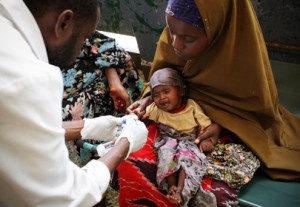
UN Photo/Stuart Price
Some may have seen my most recent article providing some highlights of a new UNICEF report on the global progress in reducing child mortality since 1990.
As always with rich reports like these, there is too much valuable info to squeeze into one article, so I’m making use of this space to draw attention to some more statistics that I think are worth mentioning.
For example:
:: Half of all under-five deaths occur in only five countries.
:: These countries are India, DRC, Nigeria, Pakistan and China.
:: 40 percent of all children dying under the age of five die within the first 28 days after birth.
:: UNICEF estimates that by 2050 one in three children will be born in sub-Saharan Africa.
Now, onto some positive news. Here are 12 former high-mortality countries that have made strides in reducing under-five mortality and are close to achieving Millennium Development Goal 4 by 2015.
Percentages are reduction:
Laos: 72 percent (MDG 4 achieved)
Timor Leste: 70 percent (MDG 4 achieved)
Liberia: 68 percent (MDG 4 achieved)
Bangladesh: 67 percent (MDG 4 achieved)
Rwanda: 65 percent
Nepal: 64 percent
Malawi: 64 percent
Cambodia: 64 percent
Madagascar: 62 percent
Bhutan: 61 percent
Ethiopia: 61 percent
Niger: 60 percent
]]>As I reported last month, [...]]]>
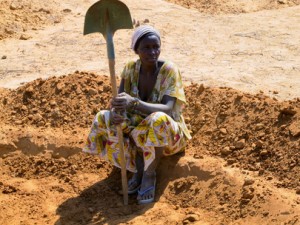
UN Photo/WFP/Phil Behan
As Beyonce’s video celebrating World Humanitarian Day continues to make its rounds through the internet, humanitarian workers on the ground in the drought-affected Sahel arguably have bigger fish to fry as they try to stave off deteriorating conditions in Niger and Mali amidst staggering shortages in relief funding.
As I reported last month, the United Nations Office for the Coordination of Humanitarian Affairs (OCHA) recently adjusted its needs projections for 2012 upward in light of what can be called a foreseeable escalation of the food crisis in the Sahel that started last fall.
Now it looks like cholera and locusts are further foiling already underfunded relief efforts across West Africa.
With four months left to the year, only 51 percent of the funding goal for the region has been met according to latest numbers by the U.N.’s Financial Tracking Service.
So far, an estimated 19 million people in the region are in dire need of assistance, many of whom were expected to rely on emergency food aid as primary means of sustenance by August.
In a special humanitarian bulletin on the Sahel crisis published last week, OCHA now warns of a developing locust infestation that could affect another 50 million people and diminish yields in the upcoming October harvest.
“Desert locust infestation remains dangerous as more egg-laying and hatching are expected in the coming weeks. Agricultural crop production, food and nutrition security, and the livelihood of some 50 million people in Chad, Mali and Niger are currently at risk, according to the FAO. This threat is the most serious since 2005.
Ground teams in Niger have treated 1,200 hectares against the pest since 5 June but ground surveys need to be scaled up to determine the scale and extent of current breeding, especially in those areas where rains have recently fallen.”
Still, rains are badly needed, as an early end to the current rainy season would further affect the upcoming harvest and increase food prices, according to a special report by the Famine Early Warning System Network.
As if that weren’t enough to juggle, cholera is now becoming an increasing worry in Niger, where refugee camps are a potential hotbed for the disease that could affect neighbouring countries along the Niger river, such as Mali, Nigeria and Benin.
About 52.000 people have fled political upheaval in Mali for Niger where 394,000 children under five will need treatment for severe acute malnutrition this year, according to UNICEF, which warns that malnutrition increases the chances of cholera outbreaks.
Nigeria has seen three times the number of cholera cases this year that it registered in 2011, according to Innocent Nzeyimana, the World Health Organization (WHO) Emergencies Manager in Niger in a recent OCHA story. “At this rate, we should be prepared for at least 9,000 cases by December.”
More from Nzeyimana:
“With high levels of water contamination and inadequate sanitation, our area is so prone to cholera. We’ve had cases in 2010 and 2011, but this time it is really getting serious.”
“In a closed environment like a camp, the spread is very fast and we may end up dealing far beyond the 9,000 projected cases. We don’t want that to happen.”
Prevention and treatment of cholera, meanwhile remains underfunded across the Sahel, with only 21 percent of the projected 53 million dollars needed for such programmes covered so far. In Niger only 30 percent of the roughly 8-million-dollar projected sanitation need has been met.
Organizations increasing their appeals
Last week, U.K.-based NGO Christian Aid doubled down on its aid appeal amidst reports by the World Food Programme (WFP) that without increased international support an estimated quarter million people fleeing political instability in Mali for neighbouring Niger, Mauritania and Burkina Faso, will go hungry in just weeks.
WFP is appealing for urgent contributions of 115 million dollars to address pipeline shortfalls for the next three months, according to last week’s OCHA bulletin, as the region is going through its lean season.
As the region awaits the fall harvest and food prices soar, many families continue to sell off their life stock, thus further diminishing their future capacity to foresee in their own livelihoods.
The United Nations Food and Agricultural Organization (FAO), which aims to build farmer’s resilience to future crises has seen less than 25 percent of its 112-million-dollar appeal met, threatening FAO’s ability to support preparations for the next food production campaign from October to December.
FAO is appealing for 10 million dollars to tackle the locust situation. So far France has contributed 550,000 dollars, and another 2.8 million has been pledged bi-laterally.
Last month, British NGO Development Initiatives released a comprehensive report on Humanitarian Aid that projected record shortfalls for 2012. Among other conclusions, the report showed a disproportionate funding for the 2010 mega-disasters in Haiti and Pakistan that syphoned away funds from other countries, including crisis prevention in countries in the now heavily affected Sahel region.
A quote from an OCHA rep in a recent AP article sums it up nicely, I think:
“Pictures of starving goats do not attract aid in the same way as images of dying children.”
Well, folks, we’re getting there.
]]>
I feel neither more “good” nor more “patient”. I am a hard-headed woman, as always. Attached to life, as ever!
The day when my friend Pigi, my oncologist, told me that I had breast cancer, I cried desperately. The first thing I did was to phone my [...]]]>
I feel neither more “good” nor more “patient”. I am a hard-headed woman, as always. Attached to life, as ever!

Paola Rolletta by Luis Abelard
The day when my friend Pigi, my oncologist, told me that I had breast cancer, I cried desperately. The first thing I did was to phone my partner to tell him this piece of news, of which I had had some premonition. And I understood that premonition really exists.
Curiously, I did not wonder “Why me?” My reaction was: “This cursed disease has hit me too!”
Perhaps some survival instinct made me articulate my feelings in this way, to ease the pain in my heart.
There are more and more of us, women between 40 and 50 years of age, diagnosed with cancer, most of hormonal origin. I must read more about the disease: until now, I have not allowed myself such reading.
First I said that I couldn’t read more about cancer until I finished this calvary of chemotherapy. Now that I finished the eight sessions, I say that I will wait to read until I have the CAT (computer axial tomography) results.
In a nutshell, I don’t want to cram on cancer because I decided to trust my three doctors, the surgeon, the oncologist and the nutritionist, to save me from this darkness.
In darkness
What shocked me most is the darkness you live through while undergoing chemotherapy. It is almost like a mirror lysergic acid experience, but instead of colourful hallucinations, they are black, like anti-matter.
Maybe it is the chemicals shot into my body during six months (eight chemo sessions, 4 FEC and 4 Docetaxel, every 21 days) that makes me see the world, inside and outside, so dark.
The darkness weighs more heavily than the hair loss, the nausea and the vomiting. This metaphysical darkness that totally grabs you is devastating: no words, gestures, musical notes or flowers. For a long time, darkness dominated my thoughts and my soul – an unnatural darkness that does not spring from disease-associated pessimism.
To find strength, I tell myself that mine is a chemical pessimism that – I hope, I trust – will save my life.
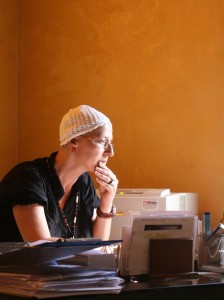
Photo: Sol de Carvalho
And I hope that radiotherapy next month will be less dark!
Feeding nitro-glycerine to my body
Earlier this year, I wanted to quit smoking and went to the naturopath for acupuncture. In her office by the sea in Maputo, Dr. Fernanda examined me and told me, without mincing words, to have a mammogram right away. Because I smoked and took birth control pills for decades, I was literally feeding a cancer with all that poison, that nitro-glycerine, she said. Just like this. Raw and cruel.
I was so frightened I took the first flight back to my home country, Italy. That saved my life! Dr. Fernanda was right, in her cruel way. Even when I did not have any symptoms, even though I had not felt any lump, she was right.
Cancer is a multi-factor disease but breast cancer is, most cases, of hormonal origin. Why these hormones go crazy and make us develop cancer it is not known yet, but that they are to blame, this is known. This knowledge is a great leap forward to cure many cancer patients and to prevent the disease.
Ten years ago I read “Illness as a Metaphor” by Susan Sontag while I was working on a documentary on AIDS in Uganda for Portuguese TV.
Ten years later, I re-read it. I tracked it down in the boxes where I stored my books when I moved to Maputo.
In the meantime, Susan Sontag died of cancer. I remember her, wearing a green dress, in a photo taken by her lover Annie Leibovitz.
Every day I repeat to myself Sontag’s call to realism: cancer can be treated with chemotherapy more efficiently than with diets or psychotherapy. Sontag unpacked beliefs that have fed the popular mythology about cancer up to these days.
Every day I repeat her words in the introduction: illness is the night-side of life, a more onerous citizenship.
The disease that has hit me contains, paradoxically, an element of reassurance: every day I must face a new day, a daily routine. Suffering serves as a mediator between my will to live and all that is threateningly unknown. But the unknown is part of life itself. It is life.
]]>In Paris, the Chilean researcher, novelist and feminist Ana (Nicha) Vazquez Bronfman had died, aged 71. She was a beacon for a generation of Latin American women for her insights on identity and gender. One [...]]]>

Motherhood, sisterhood, friendship.
In Paris, the Chilean researcher, novelist and feminist Ana (Nicha) Vazquez Bronfman had died, aged 71. She was a beacon for a generation of Latin American women for her insights on identity and gender. One concept she elaborated specially was “transculturation” – the permanent construction of identities in this world of global migration. In 2006 she wrote superbly about sexuality among the elderly – transgressions and secrets, she called it.
In Rome, my friend and fellow journalist Paola Rolletta underwent the next to last chemotherapy session against breast cancer. She was jubilant to see the end of the chemical bombardment. Like antiretrovirals, chemo saves lives but is no picnic.
So, in three hours, youth, disease, health and death touched me. Motherhood and friendship. Joy and sorrow.
Email has made this vertigo possible. News travel quickly and straight to our screens, to our hearts and minds.
News from friends
These days, breast cancer appears more frequently in news from friends.
One in the Dominican Republic and another in Mozambique finished their chemo last year. Paola is finishing hers in February. In Pretoria, where I live, another friend had her second chemo last Friday.
We had lunch together today and wondered if there is more breast cancer among women now than 50 years ago, or better detection. If the rates are higher, why? Lifestyle, fast food, stress, radiation from microwaves, cellphones and all the gadgets that crowd our life?
The Harvard School of Public Health estimates that the poor will account for more than 55 percent of breast cancer deaths this year. Read a very informative story on growing cancer rates among women in the developing world here.
A recent article in the New England Journal of Medicine argues that “western” influences such as changes in diet, less exercise, delayed childbirth, families with fewer children, less breast feeding, and hormone replacement therapy are all thought to increase the risk of breast cancer for women in low-income countries.
The good news is that breast cancer, like AIDS, is becoming less and less lethal, if detected and treated early.
I am so proud of my cancer-survivor friends. They have worn their baldness as a badge of courage and have acquired new wisdom.
And while we age and think about breast cancer, a younger generation moves closer to adulthood.
I wondered how to name and save this rambling text in my laptop. And I wrote – BLOG: LIFE.
]]>This was not an ordinary polio vaccination day for the children of Babile and Kombolcha, small towns about 500 km East of Addis Ababa. Ferenjis (foreigners in Amharic) [...]]]>
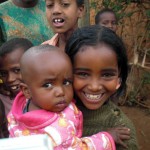
By Gifti Nadi
This was not an ordinary polio vaccination day for the children of Babile and Kombolcha, small towns about 500 km East of Addis Ababa. Ferenjis (foreigners in Amharic) had arrived!
About 100 Rotarians from the USA and Canada paid their way to Harar and Dire Dawa in Eastern Ethiopia to join local health workers in a massive drive to vaccinate 11.5 million children under five nationwide.
In recent years, 24 cases of polio have been detected in Ethiopia, likely coming from Sudan, says the World Health Organisation.
We travelled in small groups to the towns nestled against the backdrop of stunning mountains. We went door to door and were warmly welcomed by the primarily Muslim, Oromo and Somali families.
Last year, a survey showed that 70 per cent of mothers know about polio’s dreadful consequences and the benefits of vaccination, thanks to the work of dedicated community health workers.
Still, some believe that the vaccine might hurt the kids, so it was good to see the women coming forward.
Away from kitchen and kids
Note the word – women. It was 100 per cent women who brought their kids for vaccination, with the exception of one helpful young man. When a woman lied about not having any children, he convinced her to bring her kid out.
Otherwise, the men were either invisible (out in the town) or chilling out chewing chat (a mild narcotic that is legal), away from women, kitchen and kids.
Only once, in a mostly Somali village, a couple of older men came and asked us what we were doing. Just the Ferenjis in yellow shirts made them curious, I think.
Cheers for the women! They knew what the two little drops meant – a life free of polio for their children. One by one, they brought out their charming little ones while we took turns giving them the drops.
This never took place without a fight. Screams of terror and attempts to escape and spit out the drops were common, a natural reaction to being suddenly bombarded by strangers in yellow shirts.
The pictures tell all. Those under the age of 4 have a suspicious frown while their older siblings smile widely.
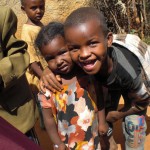
By Gifti Nadi
As we moved from home to home, the crowd grew larger. The playful kids practiced their English, held our hands and warmed our hearts. This was surely a life changing experience and a first for many on this trip.
I was blown away by the dedication and contagious spirit of mothers, community health workers and Rotarians. It was an honor to play a part in a global initiative to eradicate polio from this earth.
*The polio vaccination drive is part of a US$200 million Rotary International Campaign and matching pledges of US$355 from the Bill and Melinda Gates Foundation.
]]>Instead of striking a balance between ambition and realism, the MDGs have become [...]]]>
Instead of striking a balance between ambition and realism, the MDGs have become “money-metric and donor-centric”, “meaningless catch-all phrases.”
So says Jan Vandemoortele, a Belgian national, a United Nations senior official and one of the architects of the MDGs, in a thought-provoking article in the July issue of Development Policy Review of the Overseas Development Institute. (read it here)
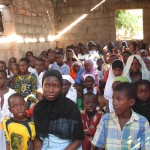
Unrealistic goal? A crowded classroom in Guinea Bissau...
The author recalls that the MDGs were set up in 2000 as collective targets based on extrapolations of global trends. They are vague by definition; they are not one-size-fits-all.
Instead, one should look at countries’ historical backgrounds, natural endowments and specific problems, then adapt the Goals to each circumstance, as Mozambique, Cambodia and Ethiopia have done.
Otherwise, this puts undue pressure on the poorest countries and, given that most of these are in Africa, nurtures Afro-pessimism.
For example, the global target for education “is not realistic” for countries in conflict, he says.
True, targets do change. For example, water for all in 2015 morphed into the more feasible goal of halving the number of people without clean water.
Magic numbers
A mantra has evolved: if only there were more money and higher economic growth, the MDGs would be achieved. Who is fond of these “magic numbers”? Staff at global headquarters of aid organisations, says the author, because of their “excessive reliance on abstract concepts.” (he should know, with his long career as a top UN official).
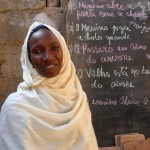
..and their teacher. By M. Sayagues
Vandemoortele sees the MDG canon being usurped by interest groups to push their agendas or devalued “as a repackaged call for more foreign aid.”
Rather, the MDG should be a tool to examine disparities and inequities within countries. In his view, the poorest people continue to be excluded. Many of these are women. Without better sex-disaggregated data, the gender dimension of hunger, illiteracy, disease and poverty remains unexposed.
Most progress takes place among the better off, and inequality and inequity keep rising, says the author.
“The targets are often presented as a universal good that will not demand tough policy choices and hard trade-offs among social groups within a country,” he says.
The MDGs should usher in new thinking about inequalities if they are not to miss the point
What do you think? Send us your views.
]]>